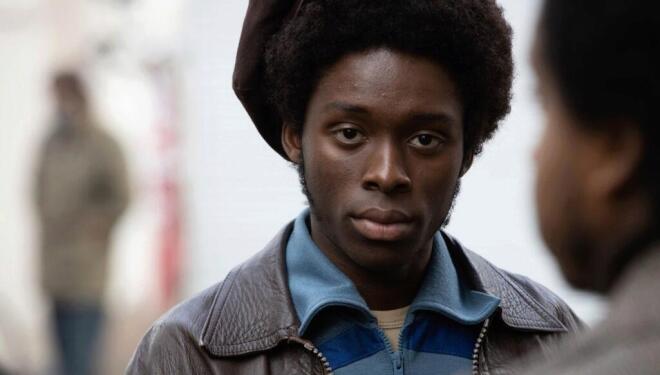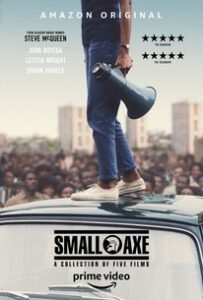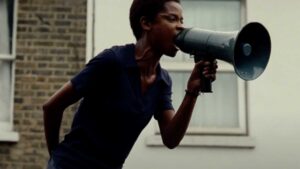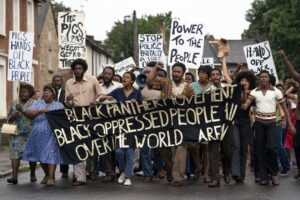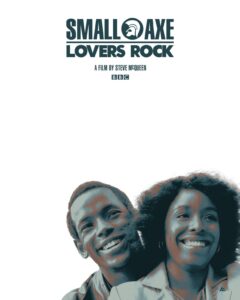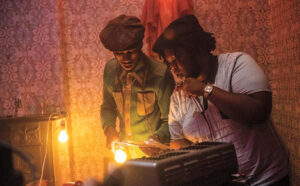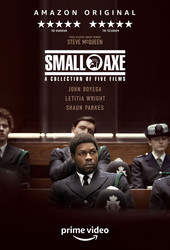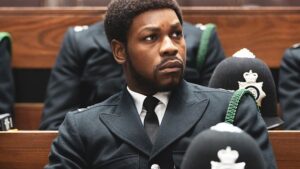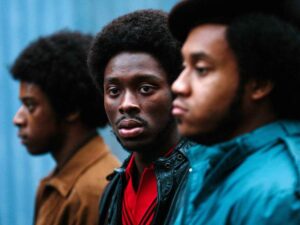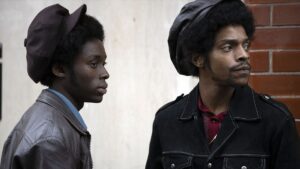In 2020, the line between film and TV has been smudged by the ubiquity of streaming. There’s probably no better example of the blur right now than Small Axe, an anthology series directed and co-written by filmmaker and visual artist Steve McQueen (Hunger, Shame, 12 Years A Slave, Widows) that originally aired through November and December on BBC One in the UK.
It was made for TV in the UK, five stories about immigrants from the West Indies living in London in the ’60s, ’70s, and ’80s. But, a few of the films (episodes?) have screened on the festival circuit, and all of them are being reviewed and included on a number of Best of the Year lists. Now they’re available here in Canada on Amazon Prime.
On the issue of whether these are films — I’m of two minds. Mangrove, Lover’s Rock and Red, White, and Blue, absolutely. They feel like cinematic work. The ambition of the last two, Alex Wheatle, a more straight-ahead biography, and Education, which runs barely over an hour, aren’t quite as movie-like. But, taken as a whole, they’re all essential viewing.
Mangrove | Written by McQueen and Alastair Siddons | 128 min
Based on the true story of the Mangrove Nine, a group from Notting Hill who were charged with rioting during a demonstration against police brutality. McQueen builds his own case with a portrait of a neighbourhood, placing restaurant owner Frank Crichlow (Shaun Parkes) at the centre of a vivid ensemble. His Caribbean eatery, the titular Mangrove, is the community hub, open to everyone, including activists like Altheia Jones-LeCointe (Letitia Wright) and Darcus Howe (Malachi Kirby). What fuels this story is a rage, intense and inchoate, fuelled by years of inequity — the racism evident to us through the experience of every Black person living under the arbitrary will of the local white bobbies.
About halfway in the film becomes a courtroom drama as the action shifts to the Old Bailey, and the lengths to which the system will go to protect its own becomes clear. I found myself comparing this to another recent courtroom drama set in the same era and channeling similar themes, The Trial of The Chicago 7. Where that film’s passion is like a candle, McQueen lights a blowtorch.
Lovers Rock | Written by McQueen and Courttia Newland | 68 min
Here McQueen recreates a single evening at an early 1980s house party where the dub is familiar, even if all the attendees aren’t. It’s where Franklyn and Martha (Micheal Ward and Amarah-Jae St. Aubyn) meet and spark on the dance floor. Despite the fairly brief running time, the film suggests complex internal lives and relationships between multiple characters, but mostly it’s about the celebration of music, of bodies moving, and a vibrant community of young people.
The emotional high point is the moment when Janet Kay’s “Silly Games” comes to a conclusion, and the dancers continue to sing every word a cappella as they groove to the music they’re all hearing in their heads.
Red White and Blue | Written by McQueen and Courttia Newland | 80 min
Leroy Logan (John Boyega) was raised by his father, Ken (Steve Toussaint) to stand up for himself, even against men in uniform, but Leroy had an aunt who was a community liaison with the local constabulary. In the early ’80s he signs up after his father is badly beaten by a pair of cops, hoping to bring change from the inside. That proves much harder than he might’ve hoped, with plenty of his fellow officers as racist as they come.
In real life Logan wrote a book about being a beat bobbie, Closing Ranks, My Life as a Cop, and helped to found The Black Police Association. McQueen’s film doesn’t get there — it’s simply about Logan coming to terms with the ways the force is resistant to change and enormous effort he must sustain to stay with it. While the narrative is straightforward, McQueen repeatedly uses reflective surfaces to get to the heart of Leroy and his father’s struggle with their identity in a reality that constantly challenges and undervalues them for the colour of their skin.
Alex Wheatle | Written by McQueen and Alastair Siddons | 66 min
Once again the Small Axe series settles in the early ’80s with the story of the youth of writer Alex Wheatle (Sheyi Cole), originally from Surrey, landing in prison and sharing a cell with a man named Simeon (Robbie Gee). We then flash back to Alex’s mistreatment in social care as a kid and his arrival in South London with no sense of his culture, getting schooled by locals and finding his way as a musician and low-level thief and drug dealer and involvement, peripherally, in the Brixton Uprising in 1981. Cole is entirely watchable, but what McQueen does best with this one is recreate a community, a place and time, with a strong sense of authenticity in the sets and costumes and performances. The grain and grit in the image helps complete the illusion of period.
As I mentioned above, though, this is where the material does start to feel more undeniably episodic. Alex Wheatle is a fine portrait of the artist as a young man, but would it have stood up on its own, separate from this group of stories? I’m not convinced.
Education | Written by McQueen and Alastair Siddons | 63 min
Kingsley Smith (Kenyah Sandy) is a regular kid at his public school in the early 1970s, with lots of friends, who has a tendency to act up once in awhile. He’s good at science and math, but struggles with reading. His principal decides he’s trouble, and so sends him to a “special school,” which his overworked mother, Agnes (Sharlene Whyte), is fine with no matter what Kingsley thinks. It turns out this place is where they send the “educationally sub-normal,” with a much higher population of Blacks than other ethnicities. A group of concerned parents of colour have gathered together to fight this kind of racist mistreatment and plan to take their case to the Secretary of State for Education and Science, one Margaret Thatcher.
Taken as part of the overall project, this is as essential a piece as any of the others in revealing the kinds of institutional oppression people of colour faced in England at the time, but this is also the film that feels the most half-baked. The issue is well-illustrated, but with not enough character around its plotting, and the slim running time, it ends up feeling a little didactic.





